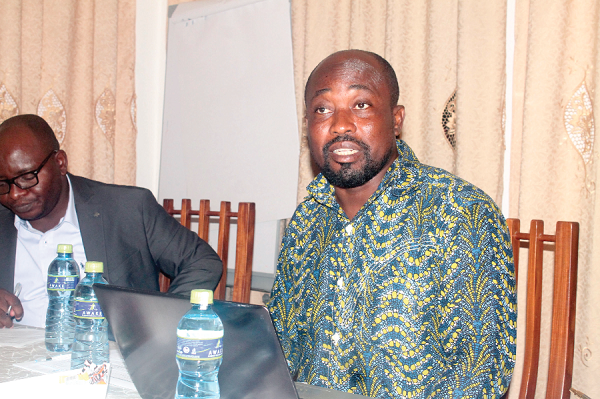The second Digital Global Biogas Cooperation (DiBiCoo)- Ghana stakeholders’ consultative workshop has ended in Accra with an assurance by the Ministry of Energy of developing a regulatory framework for the biogas industry in Ghana.
The workshop was organised by the Institute of Sustainable Energy and Environmental Solution (ISEES), a non-profit research and training institution in Ghana, to provide local stakeholders with the opportunity to work together and get involved in the DiBiCoo programme.
The DiBiCoo is European Union Horizon 2020 Project, which seeks to create a sustainable market for biogas/biomethane between Ghana, Europe, Indonesia, South Africa and 13 consultative partners in nine countries being coordinated by GIZ.
The Director of Renewable Energy of the Ministry of Energy, Mr Seth Mahu, who gave the assurance in an address, said the time had come for biogas to be brought into proper focus in Ghana because of the enormous opportunity for the country.
“My search at the Energy Commission indicates that the Commission has already taken measures to draft the first biogas regulatory framework and after this event, we are going to escalate it and get the Minister to communicate to the Executive Secretary to expedite action in developing and completing the framework for the industry.
“I want to give you the Minister’s assurance that we are going to work with the Energy Commission to ensure that the regulatory framework for biogas is developed as quickly as possible,” he said.
Mr Mahu said when that was done it would assist to turn waste into useful products such as biogas for electricity generation for heat and other applications while helping to address the major sanitation issues that confront the country.
He said it would also go a long way to bring in the needed investment, both local and foreign, to be able to accelerate and sustain the development of the economy.
“We have been able to develop Bio-Energy National Action Plan and the draft-final is currently on the Minister’s desk. Shortly we would be inviting some of you here, if not all, to join us to do the final review of that document to ensure that it meets the expectation of the industry,” he said.
Mr Mahu said: “We believe that can be a precursor to provide the necessary information, the necessary data, as well as what we will be getting from the private sector to help us come out with a regulatory framework that would be organic; that is going to address the needs of the industry.”
The Inspector in-charge of Renewable Energy at the Energy Commission, Mr Prosper Ahmed Amuquandoh, urged practitioners in the biogas industry to be self-regulatory by weeding out quacks among them.
He said: “In every jurisdiction where the market thrives, you would realize that statutory regulation has very little role to play because the industry is self-regulatory.
So you guys have to open your eyes and rout out the bad ones among you because if you have quacks; he or she would contribute to the negative experiences and negative practices either for the market or the technology,” he said.
Mr Amuquandoh said concerning the Renewable Energy Act, it was sent back to Parliament for amendment, which had already been done to allow Bui Power to get to the forefront of Renewable Energy activities and to address issues with tariffs and competitive bidding.
The Director of ISEES, Mr Lovans Owusu-Takyi, said his organization work in various sectors such as renewable energy, energy efficiency space, climate and natural resources management, bio-diversity, water sanitation and hygiene.
“One of our key areas is to create a sustainable market and to enhance access to renewable energy for both grassroots and businesses, and this DiBiCoo Project sets itself very well with us. We want to make sure that technology transfer between Europe and Africa is increased and knowledge is spread to understand the technologies that are in Europe and be able to adopt them,” he said.
Mr Owusu-Takyi said: “We hoping that district assemblies, companies that are working in fruit juice, those who are into animal husbandry and others would be able to understand the concept of biogas technologies and be able to raise the profile of biogas in Ghana.”
Latest Stories
-
ORAL campaign key to NDC’s election victory – North America Dema Naa
16 minutes -
US Supreme Court to hear TikTok challenge to potential ban
21 minutes -
Amazon faces US strike threat ahead of Christmas
54 minutes -
Jaguar Land Rover electric car whistleblower sacked
1 hour -
US makes third interest rate cut despite inflation risk
1 hour -
Fish processors call for intervention against illegal trawling activities
1 hour -
Ghana will take time to recover – Akorfa Edjeani
2 hours -
Boakye Agyarko urges reforms to revitalise NPP after election defeat
2 hours -
Finance Minister skips mini-budget presentation for third time
2 hours -
‘ORAL’ team to work gratis – Ablakwa
2 hours -
Affirmative Action Coalition condemns lack of gender quotas in Transition, anti-corruption teams
2 hours -
December 7 election was a battle for the ‘soul of Ghana’ against NPP – Fifi Kwetey
2 hours -
Social media buzzing ahead of Black Sherif’s ‘Zaama Disco’ on December 21
3 hours -
Afenyo-Markin still suffering from the massive defeat – Fifi Kwetey
3 hours -
Retain Afenyo-Markin as NPP leader, he has experience – Deputy Speaker
3 hours

